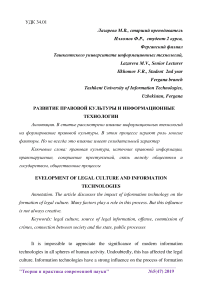Development of legal culture and information technologies
Автор: Lazareva M.V., Ilkhomov F.R.
Журнал: Теория и практика современной науки @modern-j
Рубрика: Основной раздел
Статья в выпуске: 5 (47), 2019 года.
Бесплатный доступ
The article discusses the impact of information technology on the formation of legal culture. Many factors play a role in this process. But this influence is not always creative.
Legal culture, source of legal information, offense, commission of crimes, connection between society and the state, public processes
Короткий адрес: https://sciup.org/140274585
IDR: 140274585
Текст научной статьи Development of legal culture and information technologies
It is impossible to appreciate the significance of modern information technologies in all spheres of human activity. Undoubtedly, this has affected the legal culture. Information technologies have a strong influence on the process of formation of legal culture, but is this influence always constructive? The social, social, economic, and political life of society is changing. The development of culture, including legal, is influenced by many factors. Information technologies are being actively implemented in all these areas, and in some cases they are already becoming leaders in the accumulation of knowledge and skills. Telecommunication networks are becoming the basis of the information society. The world's largest telecommunications network is the Internet, which has evolved into a massive social phenomenon, a peculiar habitat, in close contact with all aspects of society. And, of course, the Internet, as a type of information technology, influences legal culture. The Internet acts as a source of legal information, organizing the connection between the state, organizations and individuals. [1] It significantly improves the performance of legal institutions, shortens time, and makes work more efficient.
The begun process of active introduction of information and telecommunication technologies is a direct reflection of real life. It may carry some negative effects on the legal culture. This is precisely the case when the nature of the impact is not constructive. In recent years, information technologies have been used to commit crimes, disseminate materials of a hostile nature, inciting interethnic hatred and enmity, and other offenses. [2] The issue of control is quite acute.
Information technologies, influencing the legal culture, justify the emergence of new social relations, and the transfer of these relations to the main areas of society. This leads to a change in the state of legal culture. The main purpose of information technology in this area is the relationship between society and the state, and this relationship is bilateral in nature. On the one hand, this is information of the society about the activities of political and legal institutions, on the other hand, it is reactions to these actions. This increases both the productivity of legal institutions and their quality, as well as the legal culture of the whole society and its legal literacy. But it must be remembered that information technologies can also have destructive effects on legal culture. Information technologies act as a means of reflecting social values, the main task of which is to act in accordance with the requirements of legal norms, lawful activities, respect for legal regulations, respect for justice and law. [3]
Modern information technologies should give confidence in the quality of knowledge, in the real ability to influence social processes. Wrong decisions should not be due to lack of objective information, lack of competence and inefficient use of available information. Information technologies play a decisive role in building a legal information system that covers all regions, authorities and administrations, and law enforcement agencies. And this is possible only as a result of the active participation of all state structures in the banks of legal information. [4] All this should ensure the maintenance of information and legal databases, search and release of information at the request of users, organization of information interaction, collection, storage and maintenance of legal information, and, most importantly, providing interactive access of legal entities and individuals to a distributed database of legal information. Modern legal culture is a legal culture of a developed and wellfunctioning civil society and the rule of law.
From the above, we can conclude: it is necessary to continue to develop and raise to a qualitatively new level the introduction of new information technologies for the practical implementation of the ideas and values of modern legal culture, ensuring the reliability and availability of outgoing information. To develop the legal consciousness of a person and the legal culture of society as a whole, it is necessary both to develop and improve legal education and legal education of the population, and to develop and introduce new information technologies, ensure the necessary information and computer literacy, think through a clear mechanism of responsibility for use, improve forms and methods of work strictly follow all protocols and rules. Progress in the development of human culture is determined by the spiritual and material achievements of people, their success in improving their lives, in improving the forms of their existence.
Список литературы Development of legal culture and information technologies
- Lebedeva N.N. Pravovaya kultura lichnosti i Internet (Teoreticheskiy aspekt): diss. … kand. yu. nauk. M., 2004.
- Nadyigina E.V. Teoretiko-pravovoy analiz vliyaniya informatsionnyih tehnologiy na pravosoznanie: diss. … kand. yur. nauk. Nizhniy Novgorod, 2007.
- The Internet under Surveillance. Reporters without Borders 2013. Editions La Decouverte & Syros, 2013. 151 p.
- Kotrikova T.Yu. Information technologies and legal culture: on the issue of the problem development // Materials of the International Scientific and Practical Conference (N.Novgorod, April 14-15, 2011). Nizhny Novgorod, 2011.


